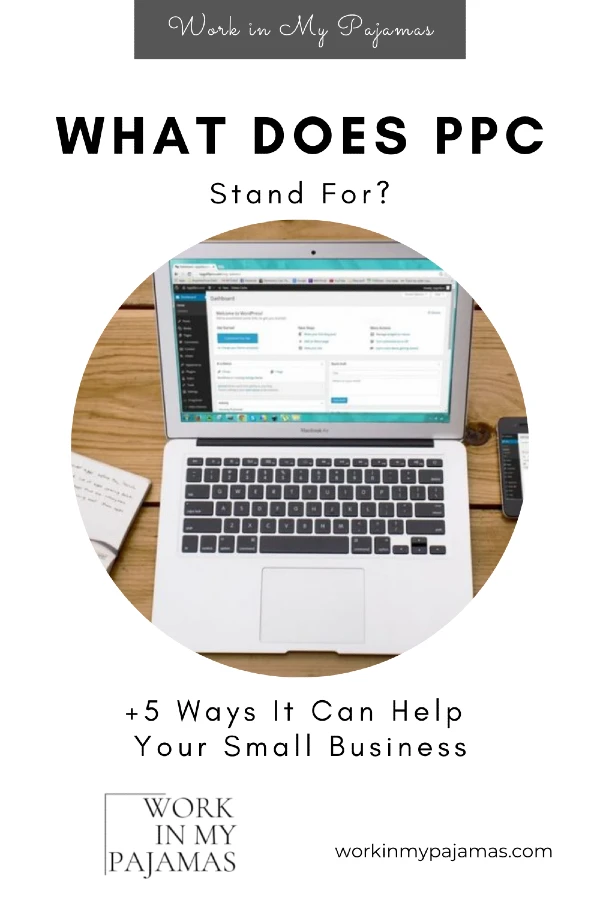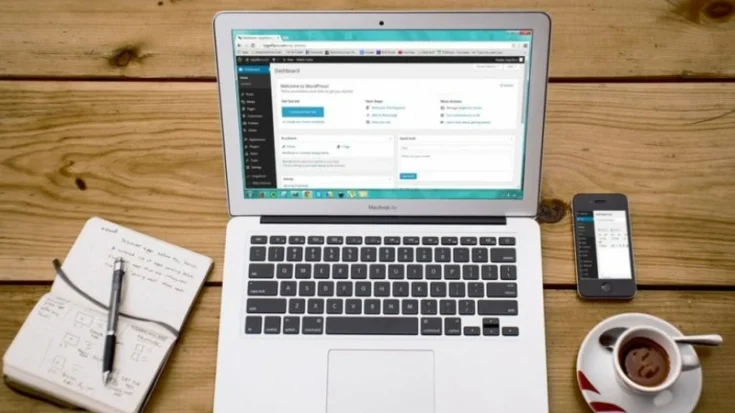Disclosure: This post may contain affiliate links, meaning we get a commission if you decide to make a purchase through our links, at no cost to you. Please read our disclosure for more info.
Last Updated on January 20, 2024 by Work In My Pajamas
SEM, SEO, PPC.
Digital marketing has a long list of acronyms for us to memorize, but what does it all even mean?
With the growing popularity of digital advertising strategies as a way to generate business, it’s time to find out!
Let’s give that last one, PPC, a look.
According to PPC Statistics, companies receive $3 in revenue for every $1.60 they spend in Google Ads. Google Ads, formerly Google AdWords, is Google’s own PPC platform and an effective way to get in front of customers.
So what does PPC stand for? Well, you’ll have to keep reading to find out! Here are five reasons your small business needs to tap into pay-per-click marketing strategies.
In This Post:
What Is PPC Marketing?
PPC stands for pay-per-click. Even if you have a very tight budget, PPC marketing is a cost-effective strategy for reaching your customers. It’s in the PPC definition; you only pay when someone clicks on your ads.
A search engine advertising strategy, PPC allows companies to drive potential, interested customers to their websites. The cost-per-click, or CPC, is based on bids.
You can set a CPC bid to limit the most you want to pay on a click.
As a small business owner, PPC allows you to save money while making money. Instead of blowing your entire marketing budget on a big print campaign, you can control your daily spend with PPC.
PPC marketing is available on Google, Yelp, Bing, Facebook, LinkedIn, and other search engine platforms. That allows businesses to reach customers regardless of their search engine of choice.
Now let’s take a look at how PPC can benefit your small business.
5 Reasons Your Business Needs a PPC Marketing Boost
The main purpose of PPC marketing is to drive customers to your website. However, PPC does a lot more to help drive your business forward, too.
1. Build Your Brand
When you place digital PPC ads on search engines like Google and Yelp, you’re also making customers aware of your business.
Search engine advertising helps small businesses build their brand awareness with engaging, relevant ads.
As customers see your ads more often, they’re also more likely to remember—and interact—with your company.
Search engine optimization (SEO) through optimized pages, images, and blog posts can take time. PPC, however, is instantaneous. With a click of a button, you can have your ads up—and your business in front of new customers!
In fact, PPC and SEO work together. AS PPC boosts your brand and brings new customers to your website, you can show Google you’re a relevant resource for those searches.
Then, your SEO ranking will boost, too!
With competitive bidding, you can also make it all the way to the top of the page. According to Power Traffik, the top three ads on a page get 46 percent of the clicks. As one of the first results to show on a search page, you can get those clicks and leads!
Check out this guide to online business for more effective strategies.
2. Reach Your Target Audience
Pay-per-click ads display based on a set of keywords you associate with your product or service.
Consider what customers are searching when they want to buy your product or hire your company. You can then use those keywords in ads to leverage their interest and draw them to your website.
Instead of waiting for customers to find you, PPC marketing allows you to target your ideal customers while they’re searching.
That way, you’re not just increasing web traffic, but traffic that’s relevant to your business.
In addition to using keyword targeting, PPC also lets you target by behavior. So if you recognize your ideal customer based on their interest, buying behavior, or the other websites they visit, you can display your ads to them, too!
PPC advertising gives you a lot more control than print methods. With PPC, you’re in control of who you advertise to and how much you spend.
Since your targeting with PPC advertising is precise, you no longer have to worry about attracting the wrong customers. This saves small businesses money and time every day.
It’s also a lot faster than other marketing strategies. That way, you don’t have to wait around for results!
With analytics, you can tell the gender, household income, age, and other demographic details. Then, you can pinpoint who converted into paying customers and only spend your money targeting that group.
Your entire advertising budget is then dedicated to the customers most likely to buy from you. That’s a much more cost-effective advertising option.
If you know your target customers and want to reach them before your competitors do, PPC is the right choice.
3. Optimize as Often as You Need
With print materials, once they’re printed, they’re done. It isn’t cost-effective to make last-minute changes to a billboard or flyers.
Thankfully, you don’t have to worry about getting stuck when using PPC ads. You can make changes on the fly from any computer, whenever you want.
Plus, PPC campaigns provide constant data. Those trackable, measurable results mean you can immediately tell what’s working—and what needs changing.
That way, you can make changes as often as you need to in order to optimize your campaigns.
Print advertising can’t tell you which decisions generated the most profit, either. With PPC, you can determine the ad language, keyword, landing page, or bid that worked best.
You can also use this data moving forward with new campaigns. As you become more familiar with PPC and your customers, it’s easier to recognize which decisions to make up front.
That way, your campaigns have the best possible start, saving you money, time, and stress.
A PPC expert can point out these areas that need improvement and help optimize your campaigns. For the experts in PPC marketing, check out Falcon Digital Marketing and their management services.
4. Convert Visitors Into Buyers
According to Wordstream, almost 65 percent of people ready to make a purchase click on a Google PPC ad.
With PPC marketing, you can target customers when they’re searching and ready to make a purchase. That way, you’re not wasting money on uninterested buyers.
You can leverage this buyer’s intent by keeping your target keywords focused. It also helps to use exciting and engaging language in your ads.
That way you can reel them in, show them the benefits of your product or service on your website, and encourage them to buy now!
Search engine marketing also helps you focus on customers who visited your website but didn’t make a purchase. Showing new ads to these web visitors is called remarketing, or retargeting.
That way, you don’t miss out on potential customers—or potential sales! Remarketing gives you a second chance to reel customers in, wow them with your website, and convert them into customers.
Search engine marketing has many methods to help you convert website visitors into paying customers. Here are more ways your business can benefit from SEM strategies.
5. Drive that Return on Investment Up
What does PPC stand for again? Pay-per-click! Since you’re only paying when customers are clicking on your ads, PPC marketing is a smart, cost-effective strategy for small businesses.
Unlike other marketing methods, PPC lets you adjust how much you’re spending and where you’re spending it. If you realize a certain keyword generates more business than another, in the middle of a campaign, you can move all your eggs into that keyword basket!
According to Unbounce, 50 percent of shoppers that click on a retail site from a PPC ad are more likely to make a purchase than those from organic links. With more conversions, your cost per acquisition (CPA) decreases.
Plus, you don’t have to increase your budget until you’re ready. Some companies start slow with PPC and make adjustments to optimize their campaigns.
As a result, they can save money sooner, rather than later.
Remember, PPC marketing puts you in control. You decide your budget, your cost-per-click, your audience, your message, your ad placement; all of it.
That way, you decide where your money goes. As you optimize your campaigns, you can target a specific CPA, so you never break your budget—or the bank.
What Does PPC Stand For: Now You’re No Longer Wondering
Now that you’re no longer asking yourself “what does PPC stand for?” it’s time to put these data-driven strategies to work! With pay-per-click campaigns, you can save money, make money, and spare yourself time trying to find the best strategy.
Pay-per-click helps you get in front of customers when they’re in the mood to make a purchase.
That way you target your ideal customers and build your brand with these customers. Plus, remarketing allows you to bring these customers back, time and time again.
With a strong PPC campaign, you can boost your small business ahead of competitors. Try it for yourself and put these benefits to the test.
Give the blog a look for more helpful resources that can help your small business grow even bigger!




